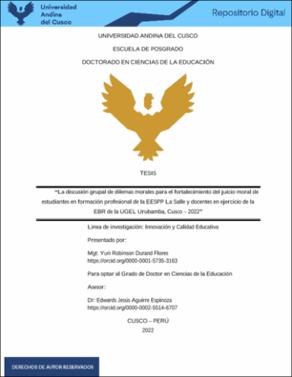| dc.contributor.advisor | Aguirre Espinoza, Edwards Jesús | |
| dc.contributor.author | Durand Flores, Yuri Robinson | |
| dc.date.accessioned | 2024-04-29T15:30:52Z | |
| dc.date.available | 2024-04-29T15:30:52Z | |
| dc.date.issued | 2023-12-19 | |
| dc.identifier.uri | https://hdl.handle.net/20.500.12557/6293 | |
| dc.description.abstract | En este estudio se examinan los resultados de la puesta en práctica de los talleres de las
discusiones grupales de dilemas morales como situaciones que presentan determinados
conflictos morales que fueron elegidos en función del nivel de desarrollo moral del
planteamiento cognitivo-evolutivo de (Kohlberg, 1979) y sus tres niveles del juicio moral.
El presente responde al objetivo de explicar en qué medida la discusión grupal de dilemas
morales fortalece el juicio moral. Optando el método cuantitativo, de tipo aplicada, con diseño
cuasi experimental; con pre y post test en dos grupos no equivalentes, en el grupo experimental
se aplicó los talleres de las discusiones grupales referidos a los seis dilemas morales
(cuestionario - DIT – Defining Issues Test de James Rest) posteriormente se aplicó la prueba de
salida o post test. La muestra de estudio estuvo considerada a los estudiantes del programa de
estudios del área pedagógica de la EESPP “La Salle” y también en docentes en ejercicio
profesional de la EBR de la UGEL de Urubamba, con un muestreo no probabilístico por
conveniencia.
Se concluye que, en el grupo experimental de estudiantes en formación profesional, hay
un incremento del 19.2%. Por otra parte, en el grupo experimental de docentes en ejercicio
también se evidencia el incremento del 21.4%. En tal sentido, los resultados inican que los
talleres de los dilemas morales sí incrementan los valores del juicio moral, sobre todo en el nivel
post convencional en las muestras del estudio de investigación. | es_PE |
| dc.description.abstract | This study examines the results of the implementation of the workshops of group
discussions of moral dilemmas as situations that present certain moral conflicts that were chosen
based on the level of moral development of the cognitive-evolutionary approach of (Kohlberg,
1979). and its three levels of moral judgment.
This paper responds to the objective of explaining to what extent the group discussion of
moral dilemmas strengthens moral judgment. Opting for the quantitative, applied method, with a
quasi-experimental design; with pre and post test in two non-equivalent groups, in the
experimental group the group discussion workshops referring to the six moral dilemmas were
applied (questionnaire - DIT – Defining Issues Test by James Rest) subsequently the exit or post
test was applied test. The study sample was considered to be students of the study program of the
pedagogical area of the EESPP “La Salle” and also teachers in professional practice of the EBR
of the UGEL of Urubamba, with a non-probabilistic sampling for convenience.
It is concluded that, in the experimental group of students in vocational training, there is
an increase of 19.2%. On the other hand, in the experimental group of practicing teachers, the
increase of 21.4% is also evident. In this sense, the results indicate that the moral dilemma
workshops do increase the values of moral judgment, especially at the post-conventional level in
the research study samples. | |
| dc.format | application/pdf | es_PE |
| dc.language.iso | spa | es_PE |
| dc.publisher | Universidad Andina del Cusco | es_PE |
| dc.rights | info:eu-repo/semantics/openAccess | es_PE |
| dc.rights.uri | https://creativecommons.org/licenses/by-nc-nd/4.0/ | es_PE |
| dc.subject | Dilemas morales | es_PE |
| dc.subject | Juicio moral | es_PE |
| dc.subject | Discusión grupal | es_PE |
| dc.title | La discusión grupal de dilemas morales para el fortalecimiento del juicio moral de estudiantes en formación profesional de la EESPP La Salle y docentes en ejercicio de la EBR de la UGEL Urubamba, Cusco – 2022 | es_PE |
| dc.type | info:eu-repo/semantics/doctoralThesis | es_PE |
| thesis.degree.name | Doctora en Ciencias de la Educación | es_PE |
| thesis.degree.grantor | Universidad Andina del Cusco. Escuela de Pos Grado | es_PE |
| thesis.degree.discipline | Ciencias de la Educación | es_PE |
| dc.publisher.country | PE | es_PE |
| dc.subject.ocde | https://purl.org/pe-repo/ocde/ford#5.03.00 | es_PE |
| renati.advisor.dni | 23854868 | |
| renati.advisor.orcid | https://orcid.org/0000-0002-5514-6707 | es_PE |
| renati.author.dni | 25305045 | |
| renati.discipline | 199018 | es_PE |
| renati.juror | Callo Sanchez, Herminia | |
| renati.juror | Huamanga Gamarra, Soraida | |
| renati.juror | Cuba Esquivel, Amadeo | |
| renati.juror | Melendrez Velasco, Elias | |
| renati.level | https://purl.org/pe-repo/renati/level#doctor | es_PE |
| renati.type | https://purl.org/pe-repo/renati/type#tesis | es_PE |




